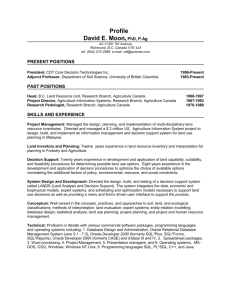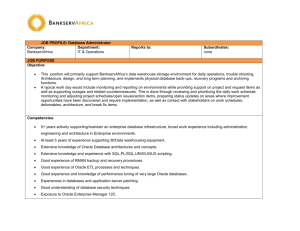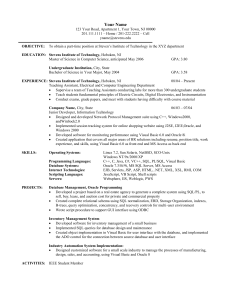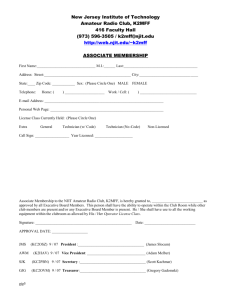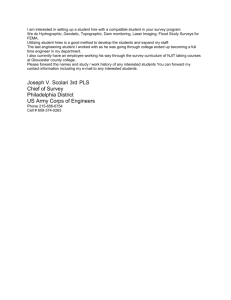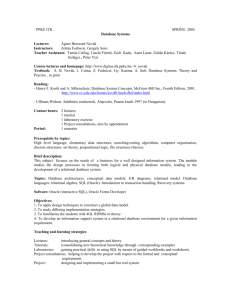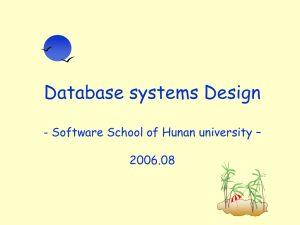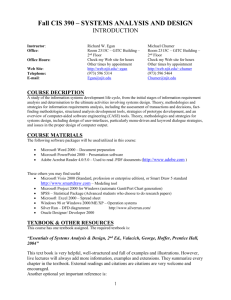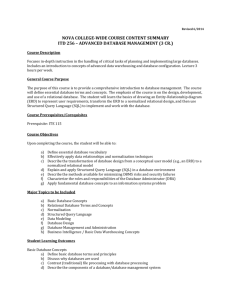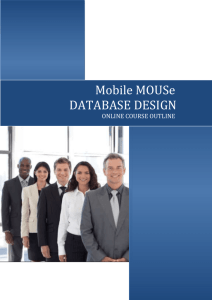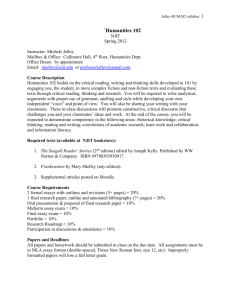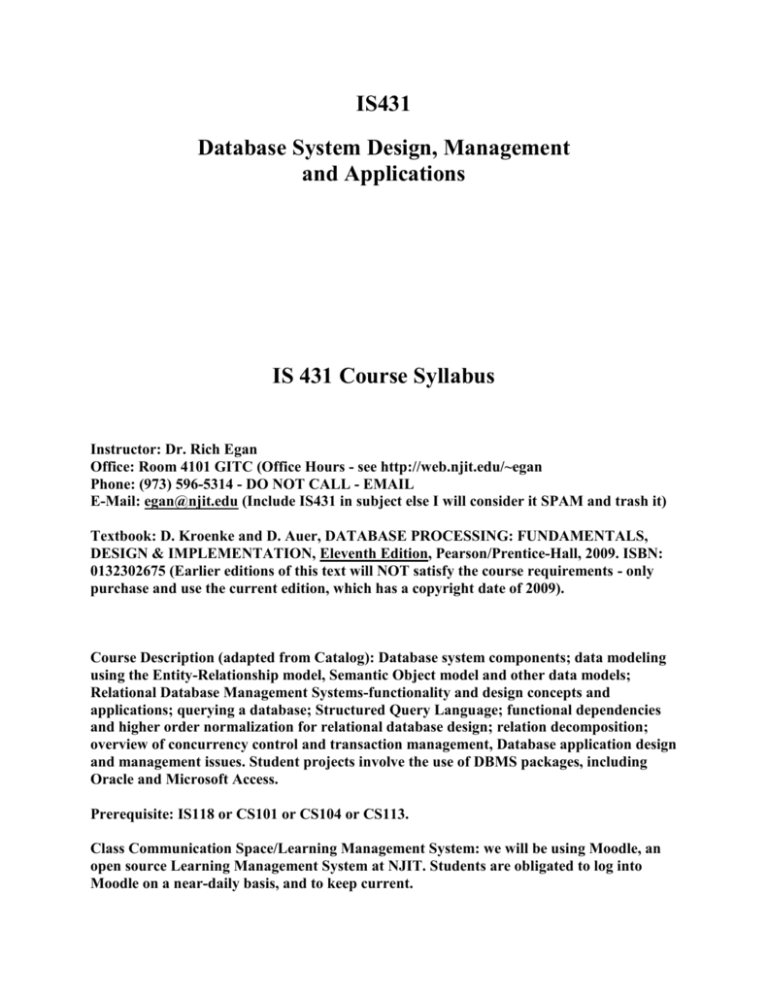
IS431
Database System Design, Management
and Applications
IS 431 Course Syllabus
Instructor: Dr. Rich Egan
Office: Room 4101 GITC (Office Hours - see http://web.njit.edu/~egan
Phone: (973) 596-5314 - DO NOT CALL - EMAIL
E-Mail: egan@njit.edu (Include IS431 in subject else I will consider it SPAM and trash it)
Textbook: D. Kroenke and D. Auer, DATABASE PROCESSING: FUNDAMENTALS,
DESIGN & IMPLEMENTATION, Eleventh Edition, Pearson/Prentice-Hall, 2009. ISBN:
0132302675 (Earlier editions of this text will NOT satisfy the course requirements - only
purchase and use the current edition, which has a copyright date of 2009).
Course Description (adapted from Catalog): Database system components; data modeling
using the Entity-Relationship model, Semantic Object model and other data models;
Relational Database Management Systems-functionality and design concepts and
applications; querying a database; Structured Query Language; functional dependencies
and higher order normalization for relational database design; relation decomposition;
overview of concurrency control and transaction management, Database application design
and management issues. Student projects involve the use of DBMS packages, including
Oracle and Microsoft Access.
Prerequisite: IS118 or CS101 or CS104 or CS113.
Class Communication Space/Learning Management System: we will be using Moodle, an
open source Learning Management System at NJIT. Students are obligated to log into
Moodle on a near-daily basis, and to keep current.
Course Goals: To understand the design and development issues regarding databases.
Students will obtain a strong conceptual foundation of the underpinnings of database
design, as well as gain experience with some commercial database management systems,
ranging from Microsoft Access to Oracle.
Lecture Notes: Slides will be posted for download each week
Course Grade Components:
· Midterm Exam (closed book) 30%
· Final Exam (open book) 30%
· Database conceptual assignments and DBMS projects 30%
· Weekly Implications - 10%
Policy on Collaboration/Cheating: Every assignment/project is a 'home-mini-exam.' The
NJIT Honor Code will be upheld. Students found cheating/collaborating/plagiarizing will
be immediately referred to the Dean of Students and the NJIT Committee on Professional
Conduct and subject to possible Disciplinary Probation, a permanent marking on the
record, possible dismissal and a grade of 'F' in the course. All submitted assignments are
carefully checked for similarities, and plagiarism and guilty students will be identified.
Policy on Lateness of Submission: Every assignment will have a due date, and all
submissions must be made by this due date. NO EXCEPTIONS. Assignments submitted
after the due date will not be accepted.
Below are the TOPICs covered in the course and the related TEXTBOOK readings.
Remember one of the keys to success in IS431 is your own self-discipline - your goal should
be to maintain currency each week, and NEVER fall behind! (Note: this is a tentative
schedule, and we reserve the privilege to modify and edit these topics for the benefit of the
course.)
TEXTBOOK,
PRESENTATIONS
Welcome, Introduction to Database Concepts and
Chapter 1 &
Database Design, Database Examples
Presentation Slides
Chapter 5 &
Entity Relationship Data Modeling and E-R Diagrams
Presentation Slides
Presentation Slides,
Relational Database Design With MS Access
and Appendix A
The Relational Algebra for Query Design, and
Presentation Slides
WEEK TOPIC
1
1
2
2
3
3
Querying a Database with GQBE
Introduction to Structured Query
Language (SQL)
Semantic Object Data Modeling, and Table Designer
1.0 Academic Edition
4
Functional Dependencies and Decompositions
4
Midterm Exam Date
5
Database Normalization (1NF, 2NF, 3NF,
BCNF, 4NF)
5
Domain Key Normal Form and Relational Design
6
Database Design Using Normalization, &
Denormalization, Updatable and
Read-Only Databases
6
Advanced SQL Design and Oracle and
Aqua Data Studio
7
Advanced SQL Design and Oracle
7
Database Redesign, SQL Correlated Subqueries, and
the SQL EXISTS and NOT EXISTS
7/21
IS431 Final Examination (OpenBook-OpenNotes)
Chapter 2 &
Presentation Slides
Appendix E, &
Presentation Slides
Chapter 3 &
Presentation Slides
(Attendance
REQUIRED)
Chapter 3 &
Presentation Slides
Chapter 3 and
Presentation Slides
Chapter 4 &
Presentation Slides
Chapter 7 (pp. 236265) and Presentation
Slides
Chapter 7 and
Presentation Slides
Chapter 8 (pp. 295301) and Presentation
Slides
(attendance required)

